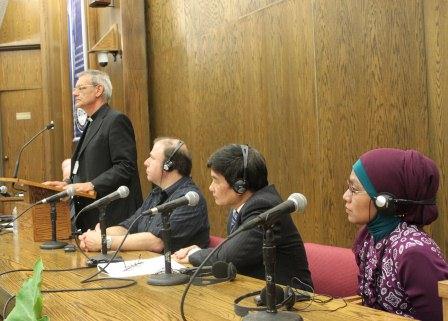Fourth Plenary Session: Conference Summation and Reflections on Conference Themes

Michael B. Wood, Research Advisor
The Nineteenth International Law and Religion Symposium concluded with its fourth plenary session.
Ten of the 80 delegates were selected to provide their personal reflections on the themes that developed during the symposium:
- Ligia Dias Fonseca, First Lady, Office of the President of Cape Verde
- William Schmidt, Doctor of Philosophy, Dean of Faculty of Religious Studies, Ethnocultural Studies and Regional Studies, John the Apostle Orthodox Institute, Russian Orthodox University, Russia
- Leilani Tuala-Warren, Executive Director, Samoa Law Reform Commission
- Derek H. Davis, Retired Director, J.M. Dawson Institute of Church-State Studies, United States of America
- Maximo Moscoso Pintado, Religious Affairs Coordinator of the State of Tabasco, Secretaria de Gobernacion, Mexico
- Frank S. Ravitch, Professor of Law and Walter H. Stowers Chair of Law and Religion, Michigan State University College of Law, United States of America
- Juan Carlos A. Valderrama, Professor, Universidad Catolica, Peru
- Jose T. Martin de Agar, Professor of Canon Law, Pontificia Universita della Santa Croce, Italy
- DO Quang Hung, Lecturer, University of Social Sciences and Humanities, Vietnam
- Cekli Setya Pratiwi, Lecturer, Universitas Muhammadiyah Malang Faculty of Law, Indonesia
After the selected delegates shared their personal thoughts, W. Cole Durham, Jr., Susa Young Gates University Professor of Law and Director, International Center for Law and Religion Studies, J. Reuben Clark Law School, Brigham Young University, United States of America, summarized his thoughts about the Symposium.
Professor Durham observed that this year’s Symposium was remarkable. He noted that one of the highlights was the participation of both Suzan Johnson Cook, United States Ambassador-at-Large for International Religious Freedom, The Office of International Religious Freedom, and Katrina Lantos Swett, Chair, United States Commission on International Religious Freedom.
Professor Durham then built upon some of the themes that the ten delegates discussed. In particular, he compared religion to water. We cannot live without water, but water also has the power to destroy life. If we build reservoirs to store water, we can use that water to sustain society. However, if the dam is breached, the unleashed water can cause terrible damage.
Similarly, if religious freedom is promoted, individuals and society will benefit and be enriched. However, if politically and socially destructive forces are unleashed on religious freedom, it can result in great damage to religion, to religious people, and to society in general.
Professor Durham observed that while religious liberty has emerged in most countries, one challenge is that it is fragile and there are forces in the world that are chipping away at it. Often this chipping away is done by exception.
Professor Durham concluded that as we build bridges of understanding, as we come to know people of goodwill, we will have a very powerful tool to promote freedom of conscious and religious liberty and to defend against the chipping away at religious freedom.